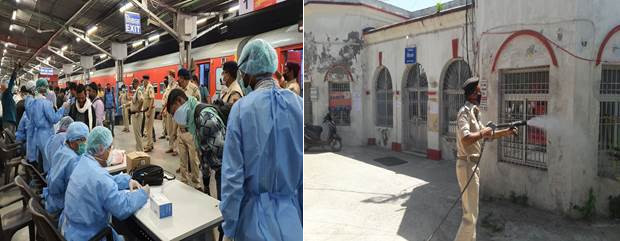Muzaffarpur district is located in the Tirhut region of the Indian state of Bihar. It is amongst the most populated districts in Bihar. Muzaffarpur faces both drought and floods in respective seasons.
With a history of disaster in each season Muzaffarpur district administration has been on a hyper active mode to fight COVID-19 since day one.
District Magistrate along with all other officers both at district and ground level have been in serious action. Officers are doing micro-planning, surprise visits, review meetings, taking initiatives, speaking to and re-assuring people. The administration is on its toes as it monitors cases, coordinates with their respective State Governments and trying to implement the lockdown in a smooth way.

One of the most important and effective tools used by the district administration of Muzaffarpur is setting up of CORONA Control room. A control room or operations room is a room serving as a central space where a large physical facility or physically dispersed service can be monitored and controlled. The district administration of Muzaffarpur, has set up a single-place single-window control room.
Out of many purposes that the control room serves, the primary purpose is to avoid confusion and duplication of information. This means, that the district control room acts as a repository of the necessary information.
The control room acts like the direct interface between governance at the district level and the public. This also signifies the importance of the listening element of the control room. In such times of disaster, when problems flow in from the various strata of the society; while the more affluent may be concerned about not getting the disease, others may have to worry about earning an income( which may be threatened by a disease or an anti-disease policy like a lockdown) , and for those away from home as migrant workers- about finding means of getting back to their homes and families.
It is a foundational task of a control room – To hear what the problems are, where and when they have exactly been hit and how that affects the victim.
Muzaffarpur district administration has set up a 24*7 CORONA Virus / COVID‐19 District Control Room which run in three shifts; fully functional from 25th March 2020 at Sadar Hospital, Muzaffarpur with 7 Landline Number 0621‐2266050, 51, 52, 54, 55, 56, 58 and a Toll Free No ‐ 180034656158.
District has also set up control rooms at the Public Health Centers of all the 16 blocks which has received total 4711 calls throughout the district till date.
The control room ensures a single incident command structure for coordination of all activities related to Covid- 19 containment and efficient use of resource. The calls come to the control room not only for the challenges of health but also ration, domestic violence, migrants stuck in different cities, business malpractices, complains about crowds at public places, information of migrants in the district, extension of help for support from volunteers and Civil Society Organisations.
The district control room is also responsible for the Output variables to be generated at micro level on daily basis; No. of Suspect case of COVID-19 No. of laboratory confirmed case No. of deaths No. of contacts line listed: No. of contacts tracked: No. of contacts currently under surveillance: No. of contacts which have exited the follow up period of 14 days.

A doctor has been permanently appointed at these control rooms for the direct counselling of the patients as and when required. All the cases that arriving in from the urban area/ places in reach of Sadar/District Hospital are directly transferred to the District Hospital manager to instant action.
In the tough times of CORONA the district administration has also kept in mind the importance of mental health. Due to lack of awareness and panic created through news/ media/ WhatsApp there is an enormous amount of distress seen in the public. A Psychologist is also appointed in each control room to talk directly to the patient and calm them down.
Officers from the PHeD department, Public Welfare and Labor Welfare Departments takes care of the case of business malpractices, ration or wage problems, migrant laborers stuck outside the district and likewise. Members from district’ technical partners like UNICEF, PLAN-India, CARE are also given duties in the control room.
A police officer from the SP office is also present in control room to tackle all the cases realted to violence and all the calls with the cases of domestic violence are forwarded either to nearest thana of the victim’s address or information is forwarded to mahila helpline (a call center set up in the district as a single platform for all the complaints related to women and child rights).
The control room has to face multiple challenges while holding the fort. The stressful times give rise to anxiety and stress amongst the community members. The lack of civic sense is also an uphill task to face. There are indeed useless calls coming day in and day out. The officials at the control room record each and every problem in a prescribed format. The format is then used to create a shift wise master sheet and compiled at the end of each day to delegate duties to concerned departments for necessary actions. The enormous amount of calls, unnecessary queries, rude tones, panick amongst the community and likewise does not stop these unnamed warriors to tackle the situation with utmost patience, love and care. They ‘listen’ to understand and take necessary actions as and when required.


